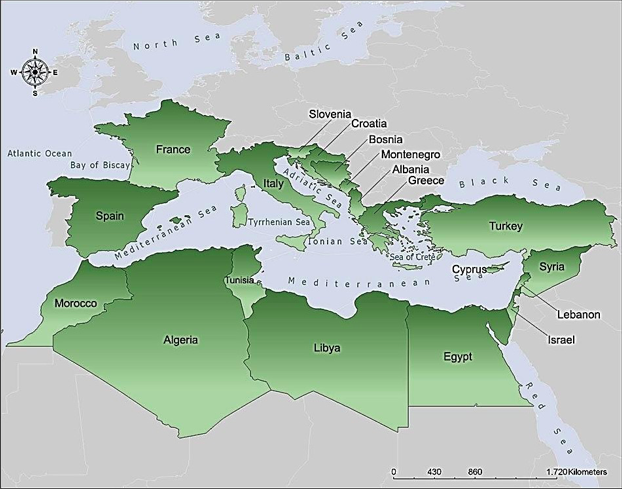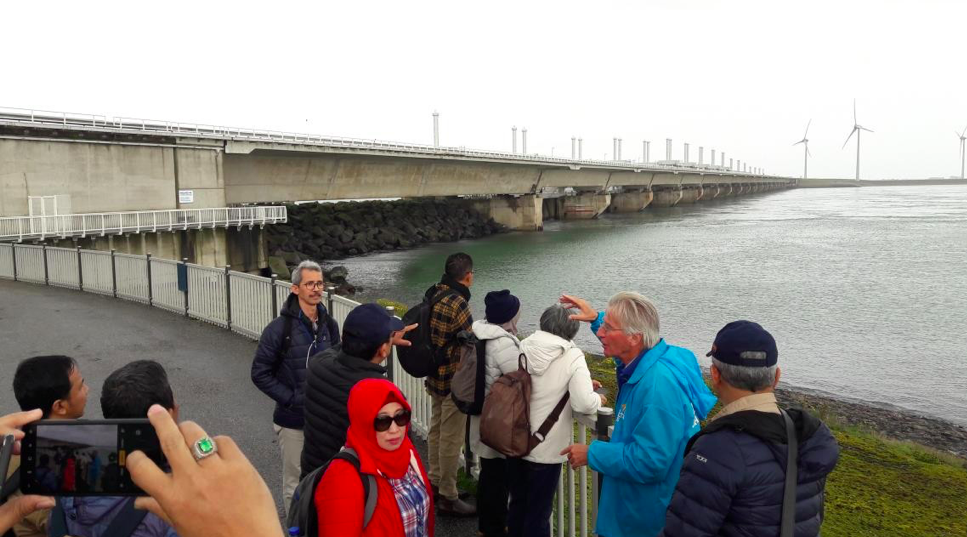2. ICZM: International perspective
<< The Integrated Coastal Zone Management (ICZM) for the Northern Coast of Central Java
Contents
[hide]2.1 Lessons on ICZM from Bangladesh Delta plan
The website of the Dutch Water Sector gives a good introduction to the Delta Plan: The Delta Plan integrates planning from delta-related sectors and from all across the country to come to a holistic plan for the Bangladesh Delta. The Delta Plan will be grounded in a long-term vision of the Delta’s future. This long-term vision, combined with the use of scenarios, allows planning to be adaptive and dynamic by constantly taking into account uncertainties in future developments in e.g. climate change, socio-economic development, population growth and regional cooperation. The Delta Plan is more than just a one-time planning exercise and aims to provide the foundation for permanent delta governance in Bangladesh through the outlining of a delta framework.
Bangladesh is the largest delta of the world. Its rivers and floodplains, which make up 80% of the country, support life, livelihoods and the economy. Bangladesh is a rapidly developing country, envisaging to be a middle-income country in 2021. The country faces major inter-related delta challenges in water safety, food security and socio-economic development and is prone to natural calamities such as floods, cyclones, and droughts. There is already high pressure on the available land and water resources in the delta1.
As stated Bangladesh is a large delta and faces many coastal issues. To create the Delta Plan adaptive delta management principles were applied. These principles are2.
- Holistic analysis of challenges and knowledge gaps in relation to multisectoral planning
- Considering main external trends and drivers and related uncertainties
- Connecting short term action / investments with long term vision and higher level policies
- Elaborating alternative adaptation pathways (and checking for possible tipping points)
- Avoiding over and under investment
- Connecting public and private (investment) agenda’s
- Developing institutional framework for the mainstreaming of the Bangladesh Delta plan
The principles of Adaptive Delta management directly apply to Integrated Coastal Zone Management. The use of a long term vision allows for a clear point on the horizon. Furthermore scenario-planning makes sure that different possibilities related to uncertainties are accounted for, making sure there are no over or under investments. Also to implement the Bangladesh Delta Plan capacity development was needed in several fields: The administrative capacity, connective and organization capacity, knowledge and learning capacity, funding capacity and natural system adaptive capacity. These principles were also applied to the Integrated Coastal Zone Management in Central Java project.
2.2 Barcelona Protocol
ICZM in Europe has a longstanding history as there was an early understanding of the importance of seas and coastal areas. In 2002, the European Parliament adopted ‘Recommendation on Integrated Coastal Zone Management’ which defines the principles of sound coastal planning and management. These include the need to base planning on sound and shared knowledge, the need to take a long-term and cross-sector perspective, to pro-actively involve stakeholders and the need to take into account both the terrestrial and the marine components of the coastal zone.
One of the important areas of implementation is the Mediterranean, where many countries share and use a vulnerable sea with important economic and ecologic significance. The cooperation to keep this sea clean and sustainable has a long history (a ICZM Barcelona Convention was signed in 1995), but the signing of the Barcelona Protocol in 2008 was an important milestone as this protocol provides an uniform guideline on ICZM for all nations in the Mediterranean.
The ICZM Protocol is a legal document and the framework for international and national Actions Plans and Road Maps.
The ultimate objective of the ICZM Protocol is to contribute to the vision for the Mediterranean Sea and coast as: “A healthy Mediterranean with marine and coastal ecosystems that are productive and biologically diverse, contributing to sustainable development for the benefit of present and future generations”3.
The strength of the Protocol is both in the scope and the legal implications: the Protocol includes land-sea interactions like pollution on land as long as this pollution reaches the sea and the Protocol is to be used as framework in spatial planning and environmental assessment tools (SEA, EIA). The Protocol also promotes ecosystem approaches and /nature-based solutions to maintain or restore the natural capacity of the coast to adapt to changes.
The Protocol is also a solution for the main problem of ICZM: sustainable management of the coastal zone will only be effective if all sectors and stakeholders apply the same ICZM principles in their policies and activities.
The Protocol applies therefore to all plans (sectoral or integrated) and this is safeguarded as the Protocol is undersigned at nation-level (not between sectoral ministries). As a result, the Protocol is an all-encompassing instrument and not a sectoral (marine or water) instrument with all the scope limitations of sectoral plans.
The Protocol contains a set of definitions (what is ICZM), a legal framework (international conventions and partnerships), objectives, principles, guidelines on cooperation and coordination and concrete guidelines on coastal protection, land use and environmental protection.
A joint centre (Priority Actions Programme/Regional Activity Centre-PAP/RAC) was established to support and monitor implementation.
2.3 Province of Zeeland (The Netherlands)
The province of Zeeland has developed a vision on their coastal zone4. This entails a strategy for an integrated approach to planning in and management of the coastal zone, of Zeeland in which all policies, sectors and to the highest possible extent, individual interests are properly taken into account, with proper consideration given to the full range of temporal and spatial scales, involving all coastal stakeholders in a participative way.
The province of Zeeland used to exist of sandy planes for about 10.000 years an then intertidal flats for around 8.000 years. Later on salt marshes, intertidal marshes and peat landscape developed. It is quite literally a land that was born out of the sea. For the last 500 years the people there have invested in water safety and reclaimed land from the sea. In 1953 during springtide a big storm hit Zeeland and because of the water level the dykes breached, many people lost their lives. Action was taken to never let this happen again: The Delta Works were built. However the last years it was seen that the coast is more than just the protection against the sea.
Based on this the province has developed their new policy, even though the province does not carry this responsibility on its own. The safety authority Zeeland is responsible for evacuation and evacuation plans. The province is responsible for secondary dikes and Rijkswaterstaat (part of the ministry) and the Water Authority are responsible for the primary dykes. As local governments gained responsibility over spatial developments in the coastal zone concerns were raised by nature and tourism organizations. So not water safety but the fear of losing the values of the current coastline triggered a participative process. The province of Zeeland decided that all organisations in the coastal zone should work together. Based on this, a coastal vision was initiated. There were many governmental and non-governmental parties involved. Equality was very important during this process. So, their role as government changed: Not the top-down policy maker, but a partner with a facilitating role so stakeholders could join forces.
2.4 Best practices
The Barcelona Protocol is a mode seems very well applicable for ICZM cooperation in Central Java:
• It provides clear definitions and scope of ICZM;
• It contains a set of guidelines for coastal management, spatial planning and economic development;
• It acknowledges the impact of terrestrial activities on the coastal area and sea;
• It lifts ICZM from sectoral planning to integrated planning;
• As all players in the coastal area are signatories, horizontal and vertical integration is assured. As in the development of the Zeeland vision a lesson is to do this early on as there are multiple interests in the coastal zone.
In the protocol a vision can be embedded which allows for adaptive planning (as in the Deltaplan Bangladesh) to make sure there will be no over or under investing. One of the main challenges in the Indonesian institutional setting is the complexity of inter-governmental cooperation, both horizontal (between departments) and vertical (between authorities). Each authority and department is mostly focused on their own interests and tasks, while not taking other interests (fully) into account. A Central Java ICZM Protocol (signed by all stakeholders) might contribute to better vertical and horizontal coordination. A supporting and monitoring centre (like PAP/RAC) would also be beneficial as this keeps all stakeholders aware of the commitments under such a Protocol and can support implementation of (sectoral) policies based on the Protocol.


